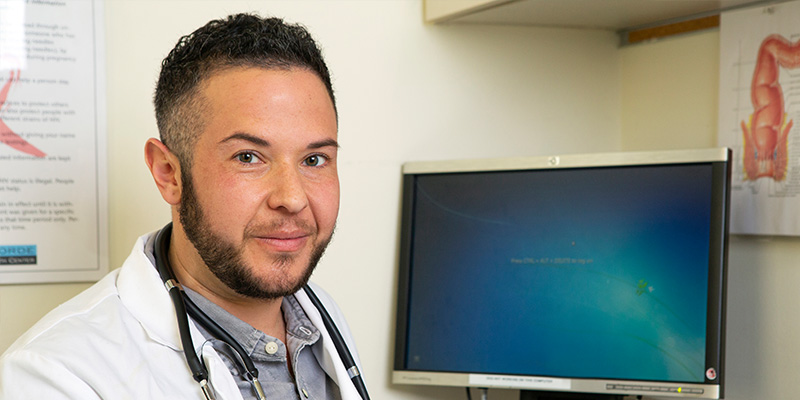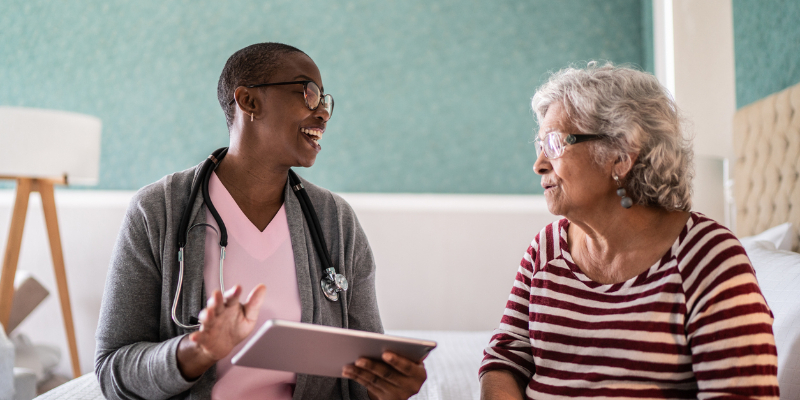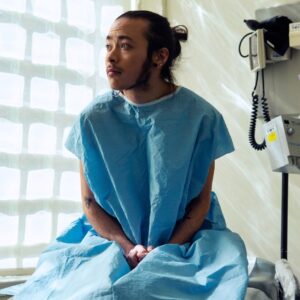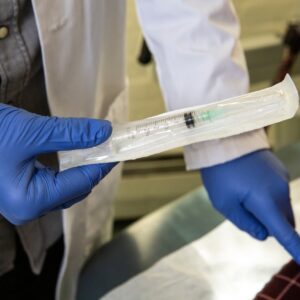2SLGBTQ+ communities face specific health challenges and barriers to accessing care. RHO offers training for healthcare and social service providers to increase their clinical and cultural competency in caring for their 2SLGBTQ+ service users.
With RHO’s new online learning platform, these trainings are easily accessible from anywhere across the province. Visit learn.rainbowhealthontario.ca today to register for your learning account and access on-demand and scheduled courses. You will get a certificate of completion for each course that you finish.
Have questions about securing training for your organization? Visit our FAQ page.
On-Demand Courses

2SLGBTQ+ Foundations Course
This self-directed, seven-module course builds your foundational knowledge for providing care to 2SLGBTQ+ people. Open to all, it’s a prerequisite for other RHO courses.
Type: e-Learning
Language: English and French
Duration: 3 hours 30 minutes (self-paced)
Credits (CEU): Earn 3.5 credits
This course’s goal is to heighten your comfort and competency in providing high-quality inclusive, affirming and culturally sensitive care. You’ll learn key 2SLGBTQ+ terminology, understand minority stress and health disparities faced by 2SLGBTQ+ communities, and improve your ability to provide comprehensive care.
Each 30-minute module encourages critical thinking and practical application. Topics include sex, gender, gender identity, gender expression, intersectionality, mental health and inclusive language.
This course was developed with feedback from the Online Learning Development Advisory Committee (OLDAC), a team of physicians, nurses, psychologists and 2SLGBTQ+ community members.
Fee: $30 (Ontario) / $50 (Outside Ontario)

2SLGBTQ+ Older Adults and Inclusive Care
This self-directed course introduces you to providing clinically and culturally competent care to 2SLGBTQ+ seniors, elders, and older adults.
Type: e-Learning
Language: English
Duration: 2 hours (self-paced)
Prerequisite: 2SLGBTQ+ Foundations Course
Through interactive case studies and practice questions, this course strengthens participants’ ability to provide affirming, inclusive care for 2SLGBTQ+ seniors. Learners will examine the lifelong health impacts of stigma and discrimination, alongside resilience factors like care networks and chosen families.
The training also addresses the unique physical and mental health needs of 2SLGBTQ+ older adults, with a focus on best practices for home care and long-term care settings.
Designed for healthcare and social service providers, this course equips professionals with the knowledge and skills to better support 2SLGBTQ+ seniors.
Fee: $20
Upcoming Courses
Removing the Barriers: Making Your Organization 2SLGBTQ+ Friendly
2SLGBTQ+ Emotional and Mental Health
2SLGBTQ+ Trauma Informed Care
2SLGBTQ+ Perinatal Care
Masculinizing Surgeries: Post-Operative Complications in Primary Health Care
Gender Affirming Hormone Therapy in Primary Care
Instructor-Led Courses
New sessions are added regularly. Review the details below to explore our current offerings and learn more about each course.
Content Level: Beginner
Duration: 3 hours
Fee: $20
Research studies in Canada and elsewhere show that 2SLGBTQ+ people report higher rates of mood and anxiety disorders, poorer self-perceived mental health and higher lifetime suicidality than their heterosexual and cisgender peers. Evidence also suggests that substance use may be higher in 2SLGBTQ+ communities due to homo/bi/transphobia, with distinct usage patterns.
This session explores how social stigma and discrimination affect 2SLGBTQ+ people’s mental and emotional health, leading to internalization and unhealthy coping strategies. Participants will learn inclusive counselling strategies, an intersectional framework incorporating lived experiences, and ways to support clients through coming out, psychological resilience and self-affirmation.
Objectives:
- Recognize the impact of homo/bi/transphobia on 2SLGBTQ+ mental health outcomes.
- Analyze common counselling issues through intersectionality, minority stress, trauma-informed care and other frameworks.
- Identify key counselling concerns for 2SLGBTQ+ clients, including coming out, SOGIECE (sexual orientation and gender identity and expression change efforts), intimate partner violence (IPV) and relationships.
- Deliver 2SLGBTQ+-positive mental health care amid interpersonal and systemic discrimination affecting emotional well-being.
Prerequisite: 2SLGBTQ+ Foundations
Open to: An introductory cultural humility module designed for health care and social service providers (including students) who counsel or advocate for clients but have little or no experience working with 2SLGBTQ+ communities.
Duration: 3 hours
Fee: $50
This course is designed for healthcare professionals, including physicians, nurse practitioners, nurses, midwives, and other practitioners, who provide perinatal care to 2SLGBTQ+ individuals and families. Learners will develop skills and gain tools to address the unique sexual and reproductive health needs of 2SLGBTQ+ people. Through an intersectional, trauma-informed lens, the course explores common perinatal issues, the impact of minority stress, and strategies for improving care. Additionally, it highlights the effects of bi/homo/transphobia on health outcomes, emphasizing the need for providers to recognize and address their own cognitive dissonance and implicit biases. By fostering self-awareness and reflection, this course equips practitioners to create more inclusive, affirming, and equitable healthcare experiences.
Participants will learn to: apply trauma-informed principles to support 2SLGBTQ+ clients; prevent re-traumatization through culturally competent care; examine their capacity for supporting client healing; and address structural barriers, power dynamics and ongoing discrimination.
Prerequisite: 2SLGBTQ+ Foundations
Open to: Health care and social service providers.
Duration: 3 hours
Fee: $20
This introductory training equips health and social service providers with foundational skills in 2SLGBTQ+-informed trauma care. The program combines trauma-informed principles with 2SLGBTQ+ cultural competencies to enhance service delivery for trauma-affected communities.
Participants will learn to: apply trauma-informed principles to support 2SLGBTQ+ clients; prevent re-traumatization through culturally competent care; examine their capacity for supporting client healing; and address structural barriers, power dynamics and ongoing discrimination.
Prerequisite: 2SLGBTQ+ Foundations
Open to: Health care and social service providers.
Content Level: Intermediate
Mainpro+ Certification: None
Duration: 4 hours
Fee: $50
This intermediate counselling module prepares health care and social service practitioners with minimal experience working with trans or non-binary autistic clients. By the end, participants will be able to: explain autism through a neurodiverse lens; recognize how cisnormativity and neuronormativity affect health-care access; identify health determinants at the autism/trans-non-binary intersection; analyze how neuronormativity creates barriers to gender-affirming care; and deliver trans-positive care amid systemic discrimination against autistic people.
Open to: Health care and social service providers.
Prerequisite: 2SLGBTQ+ Foundations
Additionally, RHO strongly recommends learners attend our Trans 101 courses prior to taking this course or have equivalent education or clinical experience. This course requires learners to be well-versed in trans and non-binary identities either through education or equivalent experience.
Content Level: Beginner
Mainpro+ Certification: 4.0 Mainpro-M1 credits (Ontario ONLY)
Duration: 4 hours
Fee: $50
This course teaches how to conduct surgery planning visits and make referrals for gender-affirming surgeries in Ontario. Participants will learn to: explain gender-affirming surgical options; navigate Ontario’s trans surgical care system; apply WPATH SOC surgical criteria; conduct effective planning visits; complete the MOHLTC Request for Prior Approval for Funding (SRS) form; and compose gender-affirming surgery referral letters.
Open to: While designed for southeastern Ontario practitioners, this session is open to all physicians, nurse practitioners, registered nurses, physician assistants, pharmacists, and students in these fields.
Prerequisite: 2SLGBTQ+ Foundations
Content Level: Intermediate
Mainpro+ Certification: 4.0 Mainpro-M1 credits (Ontario ONLY)
Duration: 4 hours
Fee: $50
Learn to conduct surgery planning visits with patients and make referrals for gender-affirming surgeries in Ontario. Participants will learn to explain transition-related surgeries, navigate Ontario’s trans surgical care system, apply WPATH SOC criteria, conduct planning visits, complete the MOHLTC SRS Prior Approval Form, and write referral letters.
Open to: Physicians, nurse practitioners, RNs, RSWs, registered psychologists, and students of these disciplines only. These are the five professions designated by the Ontario Ministry of Health and Long-Term Care to make referrals for gender-affirming surgeries.
Prerequisite: 2SLGBTQ+ Foundations
Strongly recommended: Transition-Related Hormone Therapy in Primary Health Care or Trans 101 – Adults and Seniors.
Content Level: Advanced
Mainpro+ Certification: NO Mainpro+ certification at this time
Duration: 4 hours
Fee: $50
This training prepares primary health-care providers to assess and manage complications following masculinizing surgeries. Participants will learn to: optimize pre-operative preparation to reduce complications; identify common post-surgical complications; evaluate concerning symptoms; and manage typical post-operative issues.
Prerequisites: 2SLGBTQ+ Foundations and experience working with trans and non-binary people in primary health care.
Open to: Only physicians, nurse practitioners, registered nurses, physician assistants, and students in these disciplines.
Content Level: Intermediate
Mainpro+ Certification: 4.0 Mainpro-M1 credits (Ontario ONLY)
Duration: 4 hours
Fee: $50
This course prepares primary care providers in Ontario to initiate and monitor puberty suppression for trans and non-binary youth. Participants will learn to: assess adolescent gender dysphoria; evaluate capacity to consent; identify puberty blocker criteria and contraindications; conduct required medical investigations; and provide collaborative treatment.
Prerequisites: 2SLGBTQ+ Foundations and Gender Affirming Hormone Therapy in Primary Health Care or experience providing hormone therapy to trans adults.
Content Level: Beginner
Duration: 2 hours
Fee: $20
This workshop helps organizations create inclusive, affirming services for 2SLGBTQ+ communities through systemic review and anti-oppression strategies. Participants will examine policies (HR, intake), materials (forms, signage, digital content), and workplace culture using an intersectional framework. Key outcomes include: auditing current practices; developing inclusive language guidelines; implementing welcoming environments for 2SLGBTQ+ clients and staff; and creating action plans for ongoing equity improvements.
Objectives:
- To enhance visibility and inclusion of 2SLGBTQ+ employees, volunteers, service users
- To increase capacity to provide welcoming, friendly, professional, culturally competent services to 2SLGBTQ+ service users
- To make the organization, service and programs 2SLGBTQ+-positive; policy, language, forms, signage, washroom use and waiting areas inclusive
Prerequisite: 2SLGBTQ+ Foundations
Open to: Health care and social service providers.
Content Level: Beginner
Duration: 3 hours
Fee: $20
This introductory module builds cultural competence for health-care and social service providers new to working with trans, non-binary and gender non-conforming adults and seniors. Participants will learn to: explain core gender concepts (identity, expression, dysphoria); recognize cisnormativity’s impact on care access; identify social determinants of health and transphobia’s effects; provide trans-positive mental health care amid discrimination; apply intersectional and minority stress frameworks; and support clients exploring gender identity.
Open to: All health care and social service providers who provide counselling and advocacy in a variety of settings as well as students.
Prerequisite: 2SLGBTQ+ Foundations
Content Level: Beginner
Duration: 3.5 hours
Fee: $20
This introductory module develops cultural competence for providers new to working with trans, non-binary and gender non-conforming youth (up to age 18). Note: Does not cover transitioning (see: Trans 101 – Transitioning course).
Participants will learn to: explain core gender concepts (identity, expression, dysphoria); recognize cisnormativity’s healthcare impacts; identify social determinants of health and transphobia’s effects; deliver trans-positive counselling amid discrimination; address parental misconceptions; and support clients exploring gender identity.
Prerequisite: 2SLGBTQ+ Foundations
Open to: All health care and social service providers who provide counselling and advocacy in a variety of settings as well as students.
Content Level: Intermediate
Duration: 4 hours
Fee: $20
This introductory module covers social, legal and medical transitioning for healthcare and social service providers. Note: Physicians, nurse practitioners and RNs should instead take: Transition-Related Hormone Therapy; Puberty Suppression for Trans Youth; or Surgical Transition Planning (all primary care-focused courses).
By the end of this course, participants will be able to:
- Explain the concepts of gender identity, gender expression, gender dysphoria and transition accurately
- Explain social and legal transition for children, youth, adults, and seniors
- Explain puberty suppression for trans and non-binary youth
- Explain transition-related hormone therapy for trans and non-binary adults and seniors
- Explain which transition-related surgeries are funded by the government of Ontario, Canada for trans and non-binary adults and seniors
- Recognize that transition is a process and it is unique for every person
- Practice according to WPATH’s Standards of Care
Prerequisite: 2SLGBTQ+ Foundations
Strongly Recommended: Trans 101 – Children and Youth and/or Trans 101 – Adults and Seniors.
Open to: All health care and social service providers who provide counselling and advocacy in a variety of settings as well as students.
Content Level: Advanced
Mainpro+ Certification: NO Mainpro+ certification at this time
Duration: 4 hours
Fee: $50
This course prepares primary healthcare providers to assess and manage vaginoplasty complications. Participants will learn to: optimize pre-operative preparation to reduce complications; identify common post-surgical complications; evaluate concerning symptoms; and manage typical post-operative issues.
Prerequisites: 2SLGBTQ+ Foundations and experience working with trans and non-binary people in primary health care.
Strongly Recommended: Transition-Related Surgeries: Planning, Referral and Care and
Trans 101 – Adults and Seniors.
Open to: Only physicians, nurse practitioners, registered nurses, physician assistants, and students in these disciplines.






